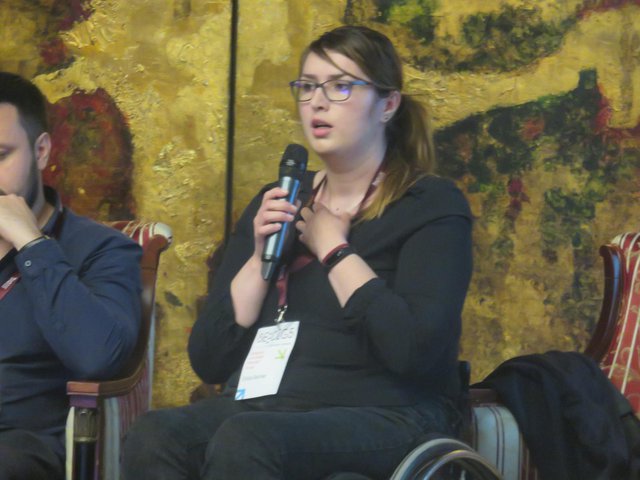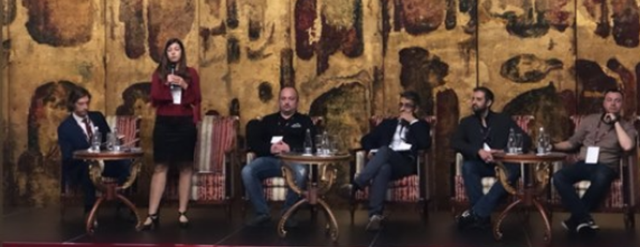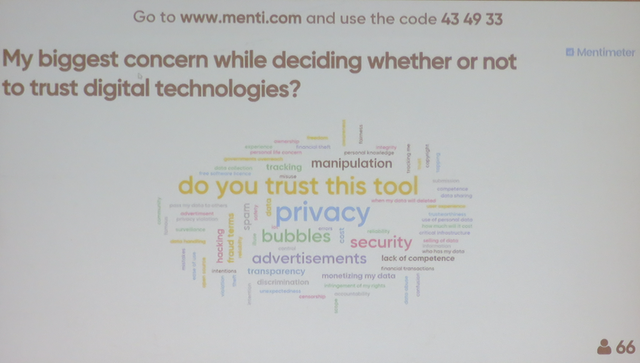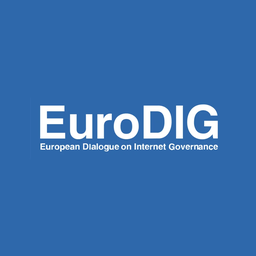The 5th edition of SEEDIG, the Internet governance event for South East Europe, is taking place from 6 to 8 May 2019 in Bucharest. You can expect sessions on cybersecurity, trust in digital technologies, technical developments, 5G, challenges of online content, the future of work and more. RIPE NCC staff at the event will be live-blogging key moments. Come back to this page for regular updates on the issues, arguments and ideas discussed over the course of the meeting.

8 May 2019, 18:35 CET
Day 2: It's a Wrap!
SEEDIG 5 has officially ended. For those of you who couldn't make it to Bucharest in person, but are curious to find out what is discussed, take a look at the online session recordings. In addition, the organisers will soon make a document available that outlines the key messages from the meeting, so check back in a few days.
- Gergana
8 May 2019, 16:35 CET
Day 2: The Future of Work and the Skills of Tomorrow
The panel discussed the impact the advancements in robotics have on the job market. More and more people today are losing jobs to machines that can do the job better and cheaper. Panelists highlighted the important role of education in giving students the required skills for the market of tomorrow and the new opportunities that will present themselves. The pros and cons of gig economy platforms were discussed. Unlike traditional jobs, which contribute to educating more people thanks to taxes, there is no similar structure for gig-economy jobs. However, the gig-economy is here to stay, as the new generation is expected to change jobs as much as 15 times in their lifetime. The question that remains open is how to guarantee the rights of both gig-economy and conventional workers.
- Hisham
8 May 2019, 15:15 CET
Day 2: The three A's: Accessible, Available, Affordable
Can you imagine asking your mum to text for you or read a webpage for you? For those have a spinal cord injury that slows down your every move, even typing a message takes too long. You slowly move your finger and manage to type one letter correctly. Yes! Then another one. Oh no, the third one is wrong, and you need to go all the way to backspace to delete it and try again. A minute has passed. "Why is this not easier?!" - you think. "And why isn’t the voice recognition on my phone better? It’s totally useless in my language!" Frustrated, humiliated and helpless – that’s the daily reality for many people with disabilities. According to estimates, one in seven people has difficulty accessing and making full use of the Internet?

Despite ratifying the UN Convention on the Rights of Persons with Disabilities, many countries in SEE are lagging behind in terms of accessibility laws and regulations, funds and resources dedicated for improving accessibility and even awareness of the problems faced. As the Internet is quickly becoming indispensable for daily tasks, ignoring the needs of people with disabilities is severely limiting their ability to fully participate in society and lead fulfilling lives.
A few examples of actions taken by NGOs were given during the session. For example an NGO in Georgia is currently suing the Minitry of Health for not making their website accessible to the visually imparted. After a successful campaign by another NGO in Turkey, it is now possible for blind students to take university admission tests. Admittedly such individual measures do make a difference and are slowly raising awareness about the urgent need to change the situation. The appeal of the room - more needs to be done and quicker!
- Gergana
8 May 2019, 13:15 CET
Day 2: Тhe Challenges of Online Content
The chair kicked off the session by inviting the audience to share some experiences of when their posts and reviews were censored, deleted or not taken into consideration. The panel covered some of the measures taken towards dealing with different types of content such as copyright infringement, terrorism, harmful or fake news. The definitions and notions of what is considered media and who is a content creator were examined and the panel discussed the need to come up with new roles and regulations for content intermediators and shapers. The overall feeling in the room was that misinformation and disinformation was the biggest challenges faced by online content.
- Hisham
8 May 2019, 10:00 CET
Day 2: Business and Entrepreneurship in SEE
The first session of the second day discussed the heavyweight topic of how South East European businesses are developing in the digital era.
Globally, consolidation and vertical integration was singled out as the leading worry for the Internet economy. As one of the Internet layers becomes more consolidated this has a knock-on effect on the other layers, leading to lack of competition and consumer choice. At the same time it was acknowledged that consolidation can also provide the benefits of scalability and improvement of the availability and quality of services. In addition, should one big actor decide to inject a more secure protocol, there will be an immediate and significant injection of security on a global scale (and vice versa if they don't!) If you have more interest in this, read ISOC’s Consolidation in the Internet Economy report.
So looking at SEE in specific, what holds businesses back? Several panelists pointed to the risk-averse mentality and the culture of verbal agreements rather than having written contracts. Some were worried about the inward-looking focus of many businesses, who don't take advantage of scaling globally.
But the picture is not so bleak. Several panelists pointed to the strong engineering schools in SEE. Another big factor that attract and supports e-business is the fiscal advantage provided by government by partially exempting them from taxes. Having a cheap workforce was described as a double-edged sword – on the one hand it attracts business and investment, but on the other, it makes highly-skilled employees likely to leave in search of better opportunities in other countries.
Most recommendations for the future centred around education, businesses and government. Universities were urged to increase the number of engineering and IT places, in order to accommodate the market pull for talent. The educational system as a whole should include entrepreneurship classes at different stages - from primary to university - and across many specialties. Businesses have an important role in attracting talent through offering competitive salaries and showing interest early on - by going to universities to give guest lectures and offering entry-level jobs and internship opportunities to students. Finally, governments were encouraged to make data available openly, to reduce the bureaucratic burden on businesses and to safeguard the democratic process. They were urged to ensure political and economic stability in order to create an accommodating business environment that would attract national and international investors.
- Gergana
7 May 2019, 16:50 CET
Day 1: Time for the Tech

There were a lot of technical developments to go though in the short window of 90 minutes, but the five presenters I had the pleasure to work with did a fantastic job. Mikhail Anisimov, ccTLD .RU, explained how regulation affects the underlying Internet infrastructure. For example, online content blocking regulation affects IP routing, DNS, search engines, URL connectivity, certification authorities and even BGP. The personal data protection regulations in different countries affect Wi-Fi authentication, personal data storage, third-party authentication providers, domain WHOIS. The Russian "Digital Sovereignty" bill has led to increased internal connectivity between Russian providers, the creation of copies of Root DNS servers in Russia and the use of local certification authorities for governmental purposes.
Next, Eric Băleanu, InterLAN and Dušan Stojičević, SOX, talked about the work IXPs do in Romania and Serbia and the importance of peering for keeping local traffic local, reducing latency and cost. They invited the audience for the next iterations of RONOG (1 October, Bucharest) and RSNOG (tbc, Belgrade) both of which are celebrating their fifth anniversary this year.
Andrea Beccalli's talk on root servers sparked a lively discussion on the importance of where root server instances are located.
Probably nobody reading this will be surprised to learn that now that the last /8 is gone, RIPE NCC is allocating contiguous /22s from our pool of returned IPv4 addresses, which is likely to run out by February 2020. My colleague Hisham Ibrahim explained that as returned addresses won’t meet demand, a waiting list might be created.
- Gergana
7 May 2019, 12:45 CET
Day 1: I don't trust you. But I'm online anyway!
Are we aware of what happens with sensitive information that we share online or the online trail we unwittingly leave when we use the Internet? Do we trust the information we see online or the apps we use? Do we care about these issues? And do we even have a choice? This session highlighted many issues, and what really kicked-off the discussion was a video showing the opinions of people on the street. We heard anything from “I have nothing to hide” and “I can’t not use the Internet, just because something bad might happen” to “I have no idea how my privacy is affected” and “I don’t fully trust my provider, but what choice do I have?” and finally “I wish there were some policies in place that make sure what we use is trustworthy”.

The online participation tool revealed audiences do not really trust advertisements and the apps they use online and have concerns about their privacy and security.
I particularly liked the comment made by Désirée Miloshevic, a member of the audience, that it is very difficult to measure trust, but that shouldn't stop us from doing it - a good first step would be to try to measure how it evolves in particular communities. In addition, she spoke of the need to build mechanisms in situations of breakdown of trust, something that is lacking at the moment.
Of course from an economic perspective it is much easier to keep trust, than to rebuild it once broken. I hope companies are taking notes!
- Gergana
7 May 2019, 11:15 CET
Day 1: Cybersecurity in South East Europe: How to ensure trust and security?
The panel opened with the question “Who is responsible for ensuring cybersecurity?”
The general agreement was that, while traditional governments were ultimately responsible for security within their borders, cybersecurity needs a multi-stakeholder approach. The importance of introducing cybersecurity-as-a-mindset and cyber-hygiene in school curriculums from an early age was underscored. The distinction between cybercrime and cybersecurity was brought forward by the panelists. Cybercrime is dealt with through CERTs or CSOs or in the criminal justice system and that is a clear mandate of governments. Even though CERTs in South East Europe work well together in areas like capacity building, the European cyber-dialogue needs the involvement of regional and national organisations. Frameworks such as the Budapest Convention on Cybercrime and the Paris that call for more online trust, bring attention to respecting and protecting basic human rights online, just as in the physical world. Attendees highlighted the need for more technical representation at different fora to share their thoughts on what measures from the real world can be implemented online in a practical manner.
- Hisham
7 May 2019, 10:15 CET
Day 1: Keynote Speeches
The first official day of SEEDIG started with talks by several of the supporting organisations. Cătălin Drulă, Chairman of the Committee on Information and Communications Technology at the Parliament of Romania, spoke about the regulatory challenges created by technology, which need to be tackled in order to ensure non-discrimination, accountability, transparency and safety. Maria-Manuela Catrina, State Secretary of the Romanian Ministry of Communications and Information Society, described the multistakeholder dialogue which led to the decision on the four EU Parliament priorities: 1) innovation; 2) cybersecurity; 3) skills and 4) women in tech. Eduard Lovin, Vice President of the National Authority for Management and Regulation in Communications, spoke of Romania's world famous fast and cheap internet. He was proud to announce that the radio spectrum allocation for the development of 5G will be completed by 2020. Finally, Chengetai Masango, United Nations Secretariat of the Internet Governance Forum (IGF), spoke of the importance of having policies based on mutual understanding and invited everyone to the upcoming IGF in Berlin.
- Gergana
6 May 2019, 17:15 CET
Day 0: Should businesses have a Chief Ethics Officer?
One of the things I love about SEEDIG is the importance placed on bringing young people to the event. The value added by their participation is clearly visible through the engaged and informed questions asked during previous conferences. The Youth Fellowship program this year selected 17 participants, who were treated to an extensive onboarding program – including several pre-event online webinars and a 0-day just for them. I had the pleasure of moderating a discussion during this preparatory day, which centred on a very topical issue – ethics.
New technologies transform our environment for the better, but they can affect society in unexpected and sometimes undesirable ways - from privacy violations, to fake news and meddling in democratic elections to algorithms deciding what content should be online and tailoring what content we should see. The online world reflects the prejudices and discrimination of our offline society, but, if left unchecked, they can amplify and institutionalise them.
In two teams, the youth fellows debated the pros and cons of having a Chief Ethics Officer in major companies to help tackle those issues. Both teams acknowledged the difficulty of agreeing on a globally relevant ethical system. They argued that on the one hand, such a position would bring more transparency, put more focus on ethical responsibility and build trust with consumers. On the other hand, worries were raised that one person could easily be side-lined or compromised, especially if their pay depends on the good fortunes and profit of the company they work for. A debate ensued about whether companies should be tasked with policing themselves, and if so, can they be trusted to do so effectively. Both teams also questioned if government regulation is the right way forward and feared the effects it might have on innovation and ultimately on the competitive advantage of European businesses. The debaters concluded that the issue was too important to dismiss and it needs to be addressed urgently, and that it is too complicated to be addressed easily by one stakeholder – be it business or be it government. Somebody has been paying attention to the benefits of having a multistakeholder model!
- Gergana





Comments 1
The comments section is closed for articles published more than a year ago. If you'd like to inform us of any issues, please contact us.
Vesna Manojlovic •
"Should businesses have a Chief Ethics Officer?" YES!